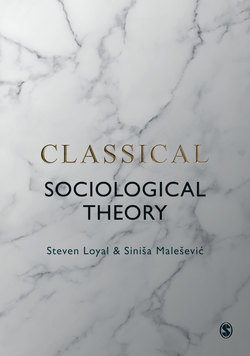Читать книгу Classical Sociological Theory - Sinisa Malesevic - Страница 23
На сайте Литреса книга снята с продажи.
Aristotle Life and Intellectual Context
ОглавлениеThe historian Geoffrey de Ste. Croix has described Aristotle as ‘the greatest of ancient sociologists and political thinkers’ (1981: 4). Ste. Croix continues:
It is natural to begin with Aristotle, who was in a class by himself among the political theorists and sociologists of antiquity: he studied the politics and sociology of the Greek city more closely than anyone else; he thought more profoundly about these subjects and he wrote more about them than anyone. There could be no greater mistake than to suppose that because Aristotle was primarily a philosopher he was, like most modern philosophers, either incapable of, or uninterested in, extensive and accurate empirical investigation. (1981: 69)
[Republished with permission of Cornell University Press from The Class Struggle in the Ancient Greek World: From the Archaic Age to the Arab Conquests, G. E. M. de Ste Croix, 1981]
Aristotle was born in the city of Stagira in Chaldice in northern Greece in 384 bce. His father Nicomachus was the physician of King Amyntas (393–70 bce) of Macedon, himself father of Philip II (382–36 bce). Macedonia at the time was an oligarchy composed of kingdoms and with a huge army and population of about 800,000. As the son of a physician Aristotle was probably taught dissection and this background may have contributed to his lifelong interest in biological studies and his belief in biology as the paradigm for the sciences. Both his parents died before Aristotle reached 17. At the age of 18 he attended Plato’s Academy, remaining there until he was 37. Although it is not known why he left the Academy, it may have been because of increasing anti-Macedonian feeling in Athens following the rise to power of Philip of Macedon, who opposed democracy. Aristotle moved to the court of Hermias of Atarneus located in Assus, before going to Mytilene on the island of Lesbos, with his assistant Theophrastus, in order to carry out research in zoology and botany. After marrying Pythias, Hermias’s niece and adopted daughter, he was invited in 343 bce by Philip II of Macedon to tutor his 13-year-old son Alexander, who became Alexander the Great, and to head the Royal Academy in Macedon. Returning to Athens in 335 bce together with Theophrastus, he founded his own school, the Lyceum, where he taught for a dozen years or so and gathered a number of research students around him – peripatetics. Since he was a metic (foreigner) in Athens he was unable to own property, including land. Living in a rented house, he collected many books, which later became part of the library of the Lyceum. It was here that Aristotle composed most of his major works, many of which have been destroyed, while others remain only as fragments or in the form of sketches or lectures for his students. Anti-Macedonian resentments re-emerged after Alexander the Great’s death in 322 bce, forcing Aristotle to leave Athens for a second time and move to Chalcis. He died later the same year in Euboea from a stomach disorder.
The relation between Plato and Aristotle, his foremost pupil at the Academy, is a matter of some controversy, with some seeing him as diametrically opposed to Plato (Nisbet, 1976), while others see him as completing the project that Plato had begun (MacIntyre, 1998). There is no doubt, however, that both continuities and discontinuities exist between their writings. Some of the major differences in their understanding of the social world result from the contrasting paradigmatic models they draw on – namely, mathematics and biology, respectively.
